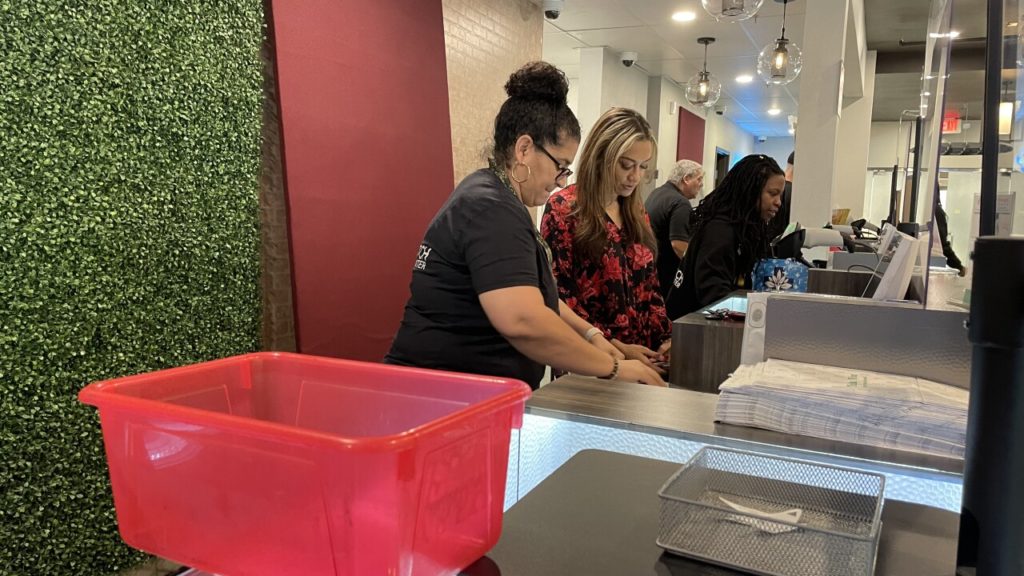LAS VEGAS (KTNV) — Many consider cannabis to be Nevada’s newest profit center. Dispensary and consumption lounge licenses are highly sought after, but not equally allotted.
13 Chief Investigator Darcy Spears has learned part of our population is under-represented in marijuana business ownership. As we continue our Black History Month coverage, Darcy shares the stories of some who are trying to change that.
Between register ring-ups and online orders, Top Notch THC serves on average a thousand customers per day. Kema Ogden co-owns the southeast Las Vegas cannabis dispensary on Stephanie near Russell road, which employs about 70 people.
UNFAIR PROCESS
Getting a foot in the door of Nevada’s billion dollar cannabis business is difficult for anyone.
“It was an unfair process for me,” says Ogden.
A savvy entrepreneur, Ogden owned a local gym, and serves as Executive Director of a non-profit community health clinic providing services for low income patients. She also created a foundation which helps an underserved population.
Despite that impressive resume and her commitment to the Las Vegas community…
“I had to fight my way through this and really focus on doing everything better than the next person to even be on a level playing field… As a minority woman, a lot of times we have to be more knowledgeable, have to have more experience, have to supersede everybody just to get an opportunity to get looked at,” says Ogden.
13 Investigates obtained newly released demographic breakdowns of Nevada’s marijuana industry from the Cannabis Compliance Board, or CCB.
There are currently 18,361 active agent cardholders. Everyone in the industry must have an agent card, from frontline retail employees to contractors and cultivators; lab techs, executive officers and owners.
According to the CCB, 840 active agent cardholders identify as executives which includes owners, officers and board members.
DISPENSARY OWNERSHIP
We zeroed in on ownership, with exactly 100 dispensaries operating in the silver state as of today; 146 owners are White. 24 identify as Asian. 17 are Hispanic or Latino. Only 3 are Black or African American.
“You have a bunch of people with all the money you can imagine, power, influence, and things that you are competing with to get these licenses. And it was very difficult,” says Ogden.
Ogden and others we spoke to believe the process is tainted, leaving people of color at a disadvantage.
“The war on drugs really affected the brown and black communities… Police arrests were four times, ten times more in those communities,” says Ogden.
Ogden and others say they’ve seen it happen all too often. Before it was legal, a young man gets caught with a small amount of marijuana and his whole life is turned upside down.
“When it wasn’t legal, you know, selling nickel bags or dime bags, try to make ends meet. Doing the business side of it and frowned upon. Catching felony charges, this and that,” says Kenneth Landrum, a cannabis consumption lounge licensee.
For decades, he says dealing drugs seemed like the only option for many African American and Hispanic men.
“Black and brown people probably, I would say, put in the footwork for the marijuana business for years,” says Landrum.
When the cannabis industry bloomed in Nevada, dispensary licenses were forbidden to anyone with a criminal history. The main goal, keeping gang and cartel influence at bay.
Now Landrum says it’s critical for Nevada and other states where marijuana is legal to ensure social equity.
“For it to be a billion-dollar industry and there’s not a lot of minority representation still doesn’t sit right with me,” says Landrum.
Nevada has made changes to address that, now allowing people with prior marijuana convictions to be considered for licenses. Only those with non-violent offenses qualify, and they must meet other criteria, such as living in a specific area where data shows high arrest rates.
TAKING A RISK
Lounges are the next step for Nevada’s marijuana industry, bringing tremendous potential along with some risk. Landrum and his partners are ready for the challenge.
“It’s a risk that I’m willing to take, and hopefully it’s a risk that the right investor is willing to take as well,” says Landrum.
But there’s more on the line than any one lounge.
“In order for it to grow, we have to support our own,” says Landrum.
Allowing minority ownership at this early stage will make history.
“So that we can, in return, pour back the financial background, the financial backing, into our own communities,” says Landrum.
Creating opportunity and stability for generations to come.
Ogden from Top Notch says in addition to paving the way for minority-owned businesses in the cannabis industry, it’s critical to have sustainability programs that will help those businesses succeed.
H/T: http://www.ktnv.com
You can view the whole article at this link Inequality in Nevada’s cannabis industry






